Is prescription drug disposal an issue in your home? How many bottles of unwanted or expired prescription drugs do you have in your medicine cabinet? Are you like me, hesitant to flush them down the toilet for fear of contaminating underground water supplies?
If you live in Alameda County, and some other areas around the country, you have a solution to pharmaceutical waste. Alameda County just passed a policy requiring drug companies to take back unwanted drugs.
And the Drug Enforcement Administration runs National Prescription Drug Take-Back Days. Four events prescription drug disposal days so far have removed 1.5 million pounds (774 tons) of medication from circulation. And another prescription drug disposal day is scheduled for September 29. Click here to find a collection site near you.
How to Get Rid of the Percoset?
I personally dealt with this issue – in a pretty big way— when I discovered large quantities of Percoset and Vicodin, two controlled substances, in my medicine cabinet after my late husband’s bout with kidney cancer.
Not wanting to dispose of the drugs in the toilet (for fear they would contaminate local waterways) or in the trash (where the drugs would linger in plastic bags on the sidewalk in front of my Upper East Side NYC coop where they could easily be slashed open), I was comforted to find that my neighborhood pharmacy would take them back. In doing so, they warned me that they didn’t have a formal program for presciption drug disposal; even if the drugs wound up in the pharmacy’s trash, I felt that the drugs might be more secure than if handled by my building, and at the very least I was making a statement of customer concern that could lead to action down the road.
Tackle Pharmaceutical Waste by Dispensing Partial Prescriptions?
In thinking about the problem of prescription drug disposal, I couldn’t help wonder if we might be able to solve it at least part-way. Why not require pharmacists to dispense a prescription for a controlled substance only half-way, giving the patient the right to pick up the remainder when it’s clear the drug will be used?
This might not work as well for drugs prescribed for chronic conditions. But think about all those time you or someone you know been sent home from surgery with a prescription for a painkiller that was, happily, used just once or twice. You get my point I’m sure.
What might be some other creative ideas for solving the pharmaceutical waste problem?

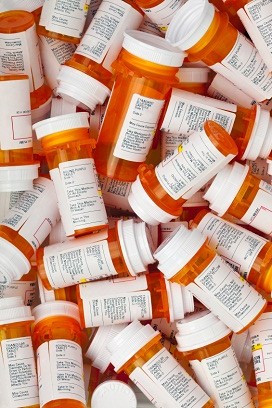
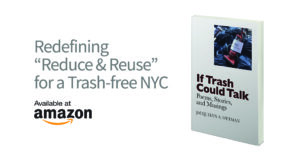
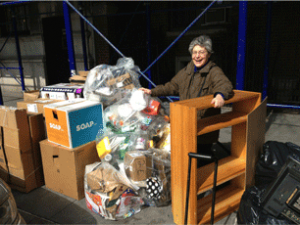
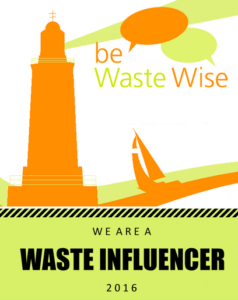
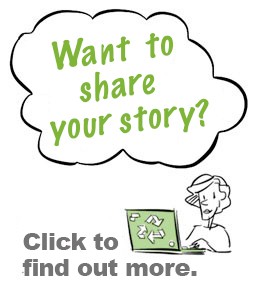
My mother recently passed away and luckily the nurse from her assited living agency took the pills to dispose of. I really dont know where they went, although I do feel they were disposed of in a safer manner than what I could have done. At least this is something the nurse was familiar with so it must be part of their procedures. On another note, I often wonder about prescription and non-prescription bottles. The RX ones are recyclable but I don’t know if most people think to peel off the labels and put them in the recycling bin. Did you know that Aveda has a program to collect caps of pill bottles and many other types of caps, and make new caps out of them? I am in no way affiliated with Aveda…. I have been collecting caps (thousands of them by now!) and giving them to a teacher friend who sends them in as part of her school program. http://www.aveda.com/cms/discover_aveda/bethechange/popup_caps.tmpl
Great info. I put it on my facebook page and Tweeted it out! Cheers!
I can’t believe it. Here in Italy the pharmacy retires all unused drugs and then sends them back to the pharma companies or recycle them, there’s a recycle system in place (and it’s not a new thing, it’s been there for decades), and it’s there in all Europe (thanks to the EMEA). When I read these things I can’t believe that the FDA didn’t organize something similar – as when I think that you don’t have standardized prescribing info for each drug, both in English and (at least) in Spanish, as we have (in Switzerland for example the prescribing info is in German, French, Italian by law.)
Wish I had known this when my grandfather was sick —would have saved me a lot of anguish.
Glad to be of help, Erin. Please spread the word — this is a major issue!!
The disposal of prescription drugs poses a unique problem because it pits environmental concerns like wasting resources and water contamination against issues of medical privacy, prescription drug abuse and complex laws controlling the production and distribution of prescription drugs. It is great that the DEA runs take back days and pharmacies allow you to return prescriptions, but these measures only partially solve the problem of waste and do not necessarily result in the proper disposal of medicine. Only those who are truly dedicated to the environment will take these steps. Medicine is arguably the most expensive and critical good we interact with as consumers, allowing us to lead a more healthy and longer life. The complex chemical nature of medicine make recycling leftover drugs on a large scale impossible, but the potential for reusing medicine is real. By creating a government sanctioned and monitored shared medicine market waste and environmental degradation will be ended, consumers will be incentivized and overall health will improve. Another possibility is a worldwide, or localized prescription drug charity where those who cannot afford medicine are able to access drugs that would otherwise be thrown away. Disposing prescription drugs needs to be looked at from an entirely different angle, one that would focus on eliminating disposal risks by ending the idea of disposing of prescription drugs in general.
I envision a future where there will be a market, potentially on the internet, where people could confidentially post about leftover medicines and those with valid prescriptions for these drugs could buy them at a prorated price. Right now the idea of a shared prescription drug economy is farfetched because of drug abuse, privacy issues, fraud and generally a lack of government authority within shared economies. But it really isn’t too crazy of an idea. Only a few things need to change for this to become a reality, and I believe these changes will indeed occur and enable a shared prescription drug economy. One thing that would need to happen is people would need to have an official medical profile online, only accessible to themselves and only able to be edited by their doctors. People would receive official digital prescription verifications from their doctors which would need to be renewed at a normal rate. With this profile people would be able to officially verify their need for prescription drugs. The government would need to set up a physical location where people could send their leftover prescriptions and their receipts for their medicine. In this location the quality and authenticity of the medicine could be tested and verified. In turn, I envision a government run and monitored digital marketplace, where these prescriptions would be resold and the original owner of the prescription would be reimbursed. Obviously, creating a shared prescription drug economy would require huge industrial and policy changes along with a dramatic increase in government involvement in the prescription drug and medical business. As the United States government moves towards universal health care, this could save the government a huge amount of money in the future, and they could even charge a small fee to post leftovers. Anyone who is prescribed a medicine they do not finish would be happy to be paid for their leftovers. It would eliminate a ton of waste and increase the overall wellbeing of our nation. Not to mention it would eliminate the risks of water contamination that arise with flushing prescription drugs, or the fear they may wind up in the wrong hands.
Another idea is that people would be able to donate their leftover medicine to those who cannot afford it. People would be thrilled to know that they were helping someone in need rather than contaminating water supplies or wasting valuable and expensive medicine. I envision a medicine bank where people send their leftover drugs and these drugs are then distributed to medical clinics around the world. Much oversight would be needed from the government, or maybe an organization like the United Nations, who would be the recipient and distributor of these drugs. I believe that the money invested in the facilities needed to monitor the leftovers received and ensure their safe distribution would be far outweighed by the gains in public health we would see across the world. There is no reason that the valuable medicines privileged people have no more use for should be wasted; they will undoubtedly provide a medical solution for someone less fortunate. This idea is also a long shot, but imagine the possible benefits and how it could realistically be carried out for starters with mainstream drugs that treat common diseases and illnesses. We already have systems like this for food and other consumer goods. Why not take the next step in bettering public health by establishing a charity that focuses on medicine?
Very intriguing ideas, Will. Of course, redistributing unused drugs would have to be done very carefully — and likely under the auspices of the drug companies themselves to make sure they were not contaminated, and also still viable.
The real opportunity for others to consume drugs not used by the original “prescribee” is the reason why a black market exists for such drugs. I know I was offered quite a bit of money for my husband’s unused Vicodin and Percoset, and was very hesitant to drop them in the trash for fear that they would get into the hands of folks who are always on the lookout for such drugs in NYC trash bags.
Hi, have to correct myself: in Europe drugs are collected separately from other waste under the label of dangerous waste and then disposed of by incineration separately from the other waste. Sometimes doctors also retire unused drugs (like Vicodin), too, to give them to other people in need. My doc at least does that 🙂
I just take my out dated and or empty prescription bottles and also over the counter containers to the local fire station they disgard of the bottles free of charge.
I agree that this is a very complicated issue. I wonder, though, if flushing our unused drugs down the toilet contaminates our water supply, doesn’t burning our unused medications contaminate our air? I guess the effect would depend on the particular construction of each drug; some might not release any chemicals but others might when burned. Again, with so many other problems, we come to the problem of choosing the lesser of two evils.
To note, my mother and I dispose of our unused drugs in dirty kitty litter. We hope that will deter anyone who might want to abuse the drugs (although that’s probably naive considering what living conditions drug abusers sometimes tolerate) and the litter might absorb and contain anything that leeches out.
Thank you, Jackie, for posting this! I just heard about your blog through TTF Watershed and really love it. =)
This is a major issue for me personally. I do not like taking medicine and refuse to take full doses of anything other antibiotics. For me the idea of the pharmacist giving out half or even quarter doses would be great. I have never used all of any medicine and whenever I try to give it back for disposal they refuse. So I am left with these medications that I do not know what to do with them. I literally keep things for years to hope that the potency has decreased before I dispose of it. It is baffling to me that pharmacies outright refuse to take things back. I keep hoping that a law will be passed forcing them to take back medicines and dispose of them as medical waste. Perhaps we can also work with the doctors to have them prescribe more reasonable amounts with more refills if possible.
FWIW, if you have unused pet medication as we did, most Vets will take back as long as not expired
Thanks for mentioning this, Jay. Makes sense, though it suggests that regulations regarding pet medication not as strict as for humans, which I guess is understandable. http://www.wehatetowaste.com/wp-admin/edit-comments.php?p=864&approved=1#comments-form
Pingback: Rethinking Pill Bottle Design (in progress) | bai
I was recently thinking about this when I was prescribed a medication. I finished this particular drug, so there weren’t any leftover pills, but I couldn’t figure out what to do with the bottle. I have a collection of bottle caps for Aveda and I hadn’t even considered these applied (forehead slap)! It still doesn’t answer what to do with the bottle. Are these made of recyclable plastics? Could you return bottles to pharmacies for reuse?
I like the idea of dispensing partial medications. I might even take it farther to dispensing only a two day supply on the medication to determine it’s reaction, especially with pain killers. I was prescribed Percoset after I had a surgery. I took one pill and the rest of the day I spent uncomfortably nauseous and vomiting. So I ended up with a whole bottle of Percoset and no use for it. I was still a teen then, so my guess is my parents simply threw out the bottle. My father works in water management so it was never a family practice to flush anything down the toilet. It would have been better to have been prescribed a day or two of the drug, because once I discovered I couldn’t stomach it then I wouldn’t have had a weeks worth of pills to waste.